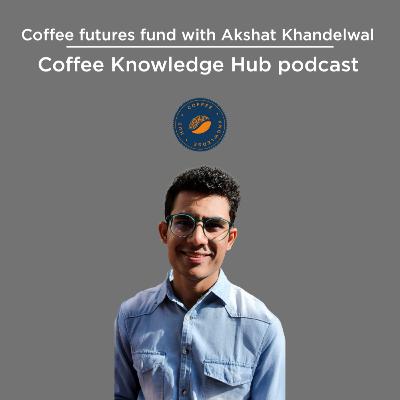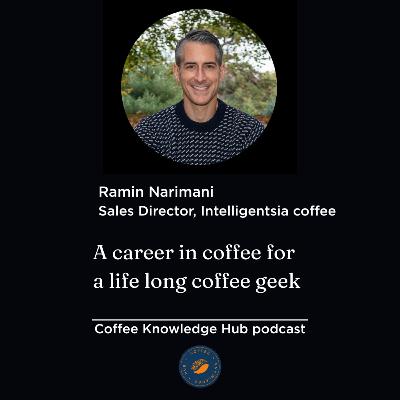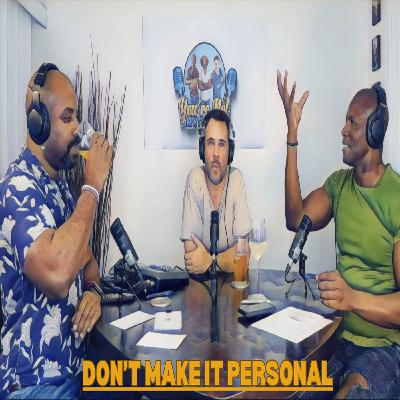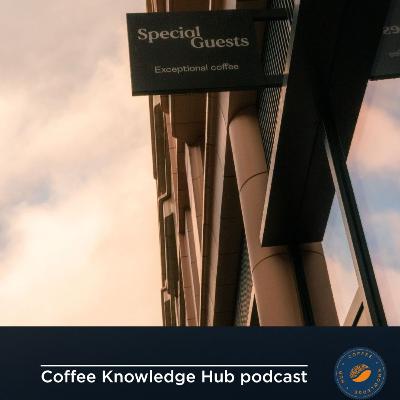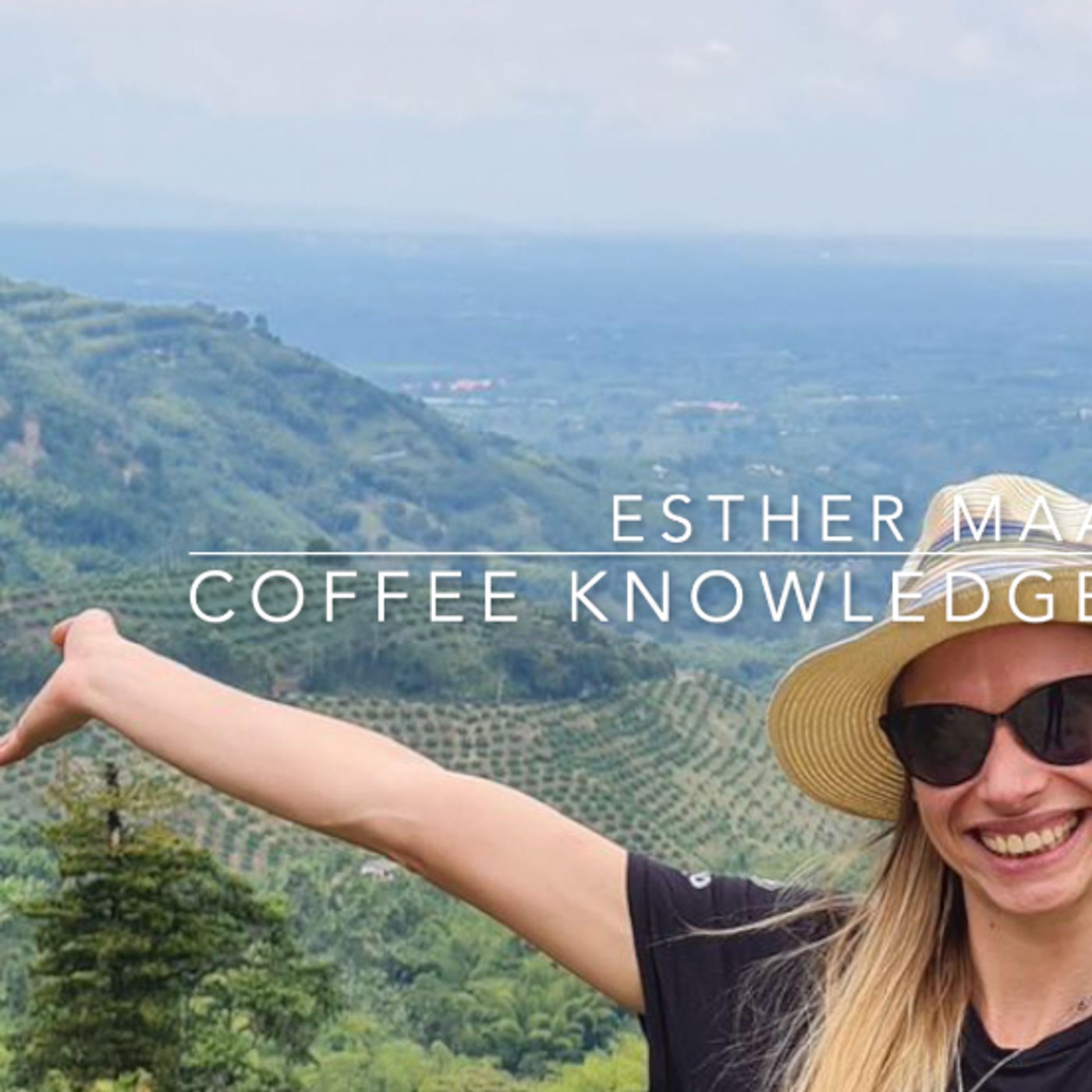Discover Coffee Knowledge Hub
Coffee Knowledge Hub

Coffee Knowledge Hub
Author: Andrew Tolley
Subscribed: 8Played: 58Subscribe
Share
© Andrew Tolley
Description
Do you work in the coffee industry or want to work in the coffee industry? This podcast is about the business of coffee, for people who want to improve their coffee businesses, start a coffee business, or be better at their jobs.
Learn from industry leaders and experts from across the globe. Learn from the mistakes many have made before.
Hosted by Andrew Tolley and Tibor Varady, whose experiences traverse cafe startup, management, training, retail, roasting, and leading diverse teams. We have a combined industry experience of over 30 years. We have been successful competitors, we are both past Chairs of the Barista Guild of Europe (as it was then).
We are excited to help you navigate the dynamic world of coffee businesses.
Learn from industry leaders and experts from across the globe. Learn from the mistakes many have made before.
Hosted by Andrew Tolley and Tibor Varady, whose experiences traverse cafe startup, management, training, retail, roasting, and leading diverse teams. We have a combined industry experience of over 30 years. We have been successful competitors, we are both past Chairs of the Barista Guild of Europe (as it was then).
We are excited to help you navigate the dynamic world of coffee businesses.
30 Episodes
Reverse
Akshat is the founder of Coffee Futures Fund, a new initiative supporting early-stage coffee shop owners with capital, mentorship, and a trusted peer network.Akshat has a background in brand storytelling and business strategy, he brings over a decade of experience as an operator, investor, and advisor to global growth-stage companies. He has supported founders in raising over $20 million in capital, building scalable systems, and aligning purpose with growth. He’s also the founder of the Coffee Owners Roundtable, a global peer community he launched during the pandemic to give coffee shop owners a space to connect, collaborate, and learn from each other.The Coffee Futures Fund mission is to flip the industry’s survival rate, and help more coffee founders thrive, together. In this interview we dig into how the fund is being set-up, the criteria for applying, the benefits of being selected and some of the challenges. Chapters00:00 Introduction to the Coffee Futures Fund05:54 The Genesis of Coffee Futures Fund11:53 Understanding the Fund Structure18:14 Investment and Revenue Sharing Model23:50 Selection Criteria for Coffee Shops29:50 Long-term Vision and Impact of the Fund41:35 Understanding Revenue Sharing and Its Implications43:46 Evaluating the Cost vs. Investment Perspective45:52 The Importance of Revenue Growth for Sustainability49:00 Flexibility in Investment Amounts and Revenue Shares52:04 Mentorship Structure and Its Impact on Business Growth56:56 Aligning Interests: The Investor and Cafe Relationship01:00:04 The Role of Environment in Business Performance01:03:02 Final Thoughts on the Coffee Futures Fund Model
We spoke to Jerome Ribot, founder of Coglode.com to get the behavioural scientists perspective on the concept of loyalty programs for cafes. Jerome is a coffee lover and was a regular at one of Andrew’s cafes from 2008. His passion for understanding people’s behaviours is contagious. In this interview we focus on the subject of loyalty. Why are we talking about loyalty - because it is at the heart of the success of many coffee businesses. Through loyalty we can increase revenue and margins at a time when revenue and margin gains are hard to come by.Fundamentally, loyalty is a positive tool we can use to support our businesses, our people and our communities. The conversation flows. Starting with defining loyalty before Jerome offers 6 elements he would utilise in a cafe loyalty program. As we move past the hour, we were heading towards a conclusion but we kept talking. So stay to the end to hear the unscripted conversation about loyalty and the value of understanding our own behaviours for personal and professional growth.Jerome RibotCoglode takes complex behavioural science research and distills it into practical insights that businesses can use for product development, marketing strategies, and customer experience design.Coglode’s work has been used by large consultancies like BCGX, Mckinsey and Deloitte, alongside pioneering companies like Apple, Google, Spotify, Octopus Energy, Meta and Monzo Bank.He also loves coffee...a lot.Coglode.comCoffee knowledge hub video
SummaryIn this episode of the Coffee Knowledge Hub podcast, Filip Bartelak discusses the complexities of coffee assessment, exploring both subjective and objective measures of quality. He shares his journey in the coffee industry, the evolution of sensory assessment systems, and the importance of understanding different coffee markets. The conversation delves into the Coffee Value Assessment System and the role of Q Graders in establishing a common language for coffee quality. Filip emphasizes the need for professionals to be well-versed in various assessment methodologies to effectively communicate and evaluate coffee quality in a global market.TakeawaysCoffee assessment can be both subjective and objective.Quality in coffee is defined by market preferences.The Coffee Value Assessment System is a new standard.Q Graders play a crucial role in coffee quality evaluation.Understanding different coffee markets is essential for professionals.Communication about coffee quality must be standardized.The evolution of coffee scoring systems reflects market changes.Subjectivity in coffee tasting can enhance the experience.Training in sensory assessment is vital for professionals.The future of coffee assessment will adapt to new trends.Chapters00:00 Introduction to Sensory Assessment in Coffee02:55 Philip Bartolak's Journey in Coffee05:25 Defining Quality in Coffee07:11 Understanding Sensory Assessment Systems09:43 The Role of Q-Grader and Coffee Value Assessment11:58 The Evolution of Coffee Quality Definitions14:14 Communication in Coffee Quality17:16 Attributes vs. Quality in Coffee19:05 The Paradigm Shift in Specialty Coffee21:39 Cultural Perspectives on Coffee Quality24:23 Subjectivity and Objectivity in Coffee Assessment26:41 The Future of Coffee Quality Assessment34:05 Understanding Sensory Assessment in Coffee37:44 The Role of Training in Coffee Evaluation42:37 Affective vs. Descriptive Assessment42:44 Navigating Coffee Quality Standards46:43 The Impact of Market Preferences on Coffee Quality51:33 Addressing Quality Disputes in Coffee Contracts52:47 The Future of Coffee Value Assessment
This is an expansive episode about the price of coffee at this inflection point in the market and how it is impacting different actors along the coffee value chain.
We talk to our friend Stuart Ritson, the European manager of Osito coffee. Stuart has worked in the coffee industry for 14 years in roles spanning barista to wholesale manager for Workshop coffee and then European sales director for Cafe Imports and now Osito coffee. This experience gives him a wealth of knowledge that he has shared with us here.
Stuart introduces what the C-market is, why it exists and who uses it. We then look at the impact of higher prices and volatility on the value chain. We consider pragmatic solutions for roasters and cafe operators to mitigate the impact of higher prices and hopefully improve their businesses.
Guidance for buying, selling, starting and operating a café business
Insights from John Richardson
Whether you are buying, selling or operating a café business, you need to understand what drives the sellable value of that business. The Café Expert, John Richardson shares his knowledge – defining a sellable business, understanding leases, all the variables to consider in valuing a business and what to consider as a buyer, or seller in single and multi-site businesses.
The insights shared could save both time and money, it is essential learning for anyone working in café businesses. For those considering starting their own cafe, it is also worth listening because you should start with the end in mind.
We spoke about many topics in this interview and edited it mercilessly but it is still a long one. During the last 30 minutes with John we go into specific details and summarise how to create sellable value.
Tibor and I also do a wrap up at the end, reflecting on what John has said and hypothesising which cafes we would buy, if we were buying a business.
Find out more about John:
https://thecafeexpert.com
https://www.instagram.com/thecafeexpert/
What does a coffee career look like when you’re a curious lifelong coffee geek? Meet Ramin N - sales director at Intelligentsia coffee - who shares a ton of insights, knowledge and experience from his 30 year journey in coffee. He has been a barista, cafe owner, trainer, technician, sales manager, sales director and a kind of general manager of a co-roasting business with a foray into retail. We cover a lot of ground in this conversation We wanted to better understand how sales works in a medium sized specialty roaster. This is valuable for anyone working in sales or who wants to work in sales to know what skills and experience are valuable in this role. We talked about the evolution of Intelligentsia coffee from the early days of specialty coffee in the US to today. We learned how they are adapting to new trends in the market and also how they are seeing these trends reflected in sales. The key take-away for us was that continuous curiosity and an entrepreneurial mindset - that takes ownership or has a strong sense of agency, will position you well in the industry for your career development and also for managing some of the more challenging times that life throws at us.
A biography, lessons in mastery, deep insights into the world of coffee and competitions - this interview with the author of Bloom, Tigger Chaturabul and her subject, World Barista Champion 2024 - Mikael Jasin, has something for everyone. Bloom is a compelling story, and we highly recommend it because it will inspire you to achieve your goals, giving you practical advice on how to do it. You will also be inspired knowing that you can reach amazing heights while being authentic to yourself, and vulnerable. Bloom celebrates how a niche craft like coffee-making can be a lens for bigger conversations about purpose, impact,and intentional living.In this episode we discuss how the book came to be, and Mikael shares some advice that will give you a small taste of what you will find in the highly readable pages of Bloom. Video for this episode will be posted on another channel soon. You can learn more about the book here:Contributor for international retail: https://contributor.coffee/products/bloom Tokopedia for Indonesia: https://t.ly/PqFM6Wholesale enquiries:Asia: info@afterhoursbooks.comUK: s.dunienville@goldhawkinternational.comInternational: tigger@contributor.coffee
Today, we're exploring an extraordinary coffee journey that spans two continents and bridges farm to cup in the most direct way possible.Our guests are the sister duo behind a unique family venture: Veruschka and Cliff, founders of Elevate Coffee in Cochabamba, Bolivia, and Vanessa and Yann, who run Muyu Coffee here in Ticino, Switzerland. Together, they've built something rare in the coffee world—a fully integrated supply chain driven by values, not just profit.Bolivia produces less than 0.5% of the world's coffee. It's landlocked, mountainous, and faces high production costs that make competing on price nearly impossible. But what Bolivian coffee lacks in volume, it makes up for in quality. Elevate works directly with these producers. They are buying coffee and exporting it to their sister company, as well as roasting and serving it in their hometown of Cochabamba. It's a model built on passion, family, and a commitment to elevating—pun intended—the voices and work of Bolivian coffee farmers, leveraging direct and close relationships at every link in the value chain. This is a unique business model, but there are universal messages for others interested in starting coffee businesses. Fundamentally clarity, vision and values that are authentic to you, are most important in starting and running your own business. Write your own story, don't copy the story of others. This is our first podcast where we are interviewing 3 people and across 2 continents. But it is also the first business I am aware of that has this specific model of ownership and structure. So, we are going to learn more about the business, how and why it was founded, what are the pros and cons of working directly with producers and selling their coffee across 2 distinct markets, how do you promote the value of the coffee in these different markets and what are the opportunities for the future. Muyu coffeeElevate coffee
In this episode of the Coffee Knowledge Hub Podcast, hosts Tibor and Andrew delve into the rising popularity of matcha within the coffee culture. They discuss the operational challenges of introducing matcha to coffee menus, the balance between specialty coffee and alternative drinks, and the health trends driving consumer preferences. The conversation also touches on bar design, customer experience, and the potential for automation in beverage preparation. Throughout the discussion, they emphasize the importance of understanding customer needs and the evolving landscape of beverage trends.TakeawaysMatcha is becoming a significant trend in coffee culture.Operational challenges exist when introducing matcha to menus.Balancing specialty coffee with alternative drinks is crucial.Health trends are influencing consumer preferences for beverages.Bar and menu design should enhance customer experience with new drinks.The preparation of matcha can impact its taste and quality.Quality sourcing of matcha is essential for business success.Understanding customer demographics can guide beverage offerings.Automation may play a role in the future of beverage preparation.Creating unique experiences can differentiate cafes in a competitive market.Chapters00:00 The Rise of Matcha in Coffee Culture02:35 Film Industry and Matcha's Popularity05:24 Operational Challenges of Introducing Matcha07:49 Balancing Specialty Coffee and Alternative Drinks10:38 Health Trends and Matcha's Market Position13:06 Whisking Matcha: Tradition vs. Convenience15:44 Introducing Matcha to Your Menu17:22 Quality and Pricing of Matcha Drinks22:13 The Price Perception of Coffee vs. Matcha23:43 The Rise of Health and Wellness Trends26:53 Aligning Brand Values with New Offerings32:27 Innovating Cafe Bar Design for Diverse Drinks36:09 Understanding Customer Preferences and Market Trends40:27 The Future of Automation in Coffee Shops
Join us for an inspiring conversation with Alejandro Gil Rivera, who inherited a coffee farm under challenging circumstances. With no prior experience, Alejandro has embarked on a journey to transform his farm into a thriving business. Discover how he leverages his project management skills to innovate and adapt, tackling issues like climate change, price volatility, and the complexities of the coffee market. Alejandro's story is a testament to resilience and the power of learning, offering valuable lessons for anyone facing adversity. Tune in to explore the intersection of tradition and technology in modern coffee farming.Follow AlejandroCoffee knowledge hubBella Vista coffee farmLinked INStay in touch:Coffee Knowledge HubCoffee Knowledge Hub InstagramLinked In
In this episode of the coffee knowledge hub podcast, Tibor and Andrew speak to the co-founder of Lunjoe, Daniel Greenberg. Daniel discusses how Lunjoe (Lun-joe), a table reservation platform for coffee shops can help to optimise space and increase revenue for cafe owners. It also gives assurance to customers they will have a table, even in a crowded and bustling cafe. He shares insights into the app's development journey, business model, user experience, and the challenges faced by coffee shops in a competitive market. The conversation also explores growth strategies, membership programs, and the impact of the app on cafe culture.As usual, Tibor and Andrew have a follow up chat about the conversation after saying good bye to Daniel. So stay tuned for the analysis at the end. TakeawaysLunjoe aims to help coffee shops increase profitability by optimizing sit-in trade.The app allows cafe customers to reserve tables, ensuring availability for meetings and social gatherings.We interroagate the app's business model to understand implications for cafe marginsUser experience is prioritised, with a focus on minimising friction in the reservation process.The app offers a free trial of 50 reservations to encourage adoption among cafes.Lunjoe is designed to enhance customer experience while supporting local coffee shops.Feedback from users and cafe owners is crucial for continuous improvement of the app.The app includes features like waitlists and notifications to enhance user engagement.Daniel emphasizes the importance of providing value to coffee shop owners to ensure long-term success. Chapters00:00 Introduction to Lungo: A New Coffee Experience06:11 Understanding the App's Functionality11:28 From Idea to Execution: Building the Team14:15 Growth Strategies and Future Plans16:33 Customer Engagement and Loyalty Programs19:09 Navigating Cafe Culture and User Behavior21:50 Technical Aspects and Payment Processing23:38 Future Developments and Features26:29 Conclusion and Call to Action33:24 The Value of Meeting Spaces Outside the Office33:46 Engaging with Coffee Shop Owners33:54 Pricing Strategies for Coffee Shop Reservations35:17 Delivering Value to Coffee Shop Owners37:02 Understanding Average Transaction Value (ATV)38:34 The Concept of Selling Unused Capacity40:05 Challenges of Reservations in Coffee Shops41:58 The Pros and Cons of Reservations43:43 Onboarding and Daily Operations for Coffee Shops45:10 The Importance of Feedback and Iteration56:18 Reflections56:25 The Flow of Conversation56:44 Challenges in Cafe Management57:42 The Role of Technology in Cafes58:08 Evolving Cafe Culture59:00 User Journeys in Cafes01:00:10 Customer Training and Adoption01:01:02 Competing with Co-Working Spaces01:01:54 Creating Unique Cafe Experiences01:03:25 Behavioral Adaptation in Cafe Culture01:03:58 The Impact of Technology on Cafe Dynamics01:04:20 Revenue Models for Cafes01:05:34 The Future of Cafe ReservationsFind out more:Daniel Greenberg is the co-founder of Lunjoe, the patent-pending platform that helps coffee shops become more profitable by offering reservations at select tables.Lunjoe has been crucial in helping coffee shops with a lot of laptop users.Recently, Daniel graduated from Brown University with a degree in Behavioral Decision Sciences and a data fluency certificate. If you would like to join Lunjoe, feel free to reach out to daniel@lunjoe.comLinkedInTikTokLunjoe’s website: lunjoe.comDownload “Lunjoe” On the Apple App Store (Android Coming Soon)See how it works: Coffee Island case study KeywordsLunjoe, coffee shop reservations, cafe culture, business model, user experience, growth strategies, loyalty programs, payment processing, cafe operations, startup journey
Tibor and Andrew finish 2024, season 1 of the CKH podcast, reflecting on trends in the South East Asian coffee industry and why we should be paying close attention to what they are doing in other parts of the world.
We also discuss trends for 2025, C-price, latte art patterns and more.
Watch the video on Spotify or on the coffee knowledge hub
If you’re a café operator struggling with rising costs and declining revenue, this episode of the Coffee Knowledge Hub Podcast is just what you need. We sit down with John Richardson, The Café Expert, to dive into the numbers and explore practical strategies to boost your margins. This episode is packed with actionable advice that you can start implementing right away.
With over 30 years of experience, John has founded, sold, and consulted on hundreds of successful businesses, helping them grow and thrive.
12 cups explainer: https://thecafeexpert.com/numbers/
Contact John:
Free cafe and coffee shop owners Facebook group.
https://www.facebook.com/groups/cafeandcoffeeshopprofits/
Instagram
https://www.instagram.com/thecafeexpert/
Chapters:
0:00 - John's professional history, defining COGS and labour costs
41:00 - 12 cup model
44:00 - Wastage impact on profit as a percentage
46:50 - Increase revenue
51:00 - Evaluating the ‘we need more staff conversation
58:25 - Operational complexity
1:01.30 Top 10/bottom 10
1:09 - Improving variable costs
124:50 - Avoiding being overwhelmed
Paul’s voice has that croaky sound which is the product of long hours of work at the expense of sleep. While the cafe has dominated his time, he has also needed to continue working on the core business and his additional coaching work. At least he is not bored :)In this episode we talked about the first month of opening of the cafe. Did it go as expected? Were our predictions accurate?This is the final part of our series following Paul's journey in opening the cafe. You can start at episode 1 of the series to get the full picture of what it is like to open a cafe. His journey is unique in that it is his business and his location, but it is not unusual to face all the challenges that Paul has had to overcome. If you are considering opening a cafe, you can learn from Paul's experience as he describes it here.You can watch the video on the coffee knowledge here: https://community.coffeeknowledgehub.com/c/podcast/For quick reference here is the series:Episode 1 - https://open.spotify.com/episode/4KxgQt8U1QFkmAWbxCGj7y?si=933419074b40414aEpisode 2 -https://open.spotify.com/episode/11XWKFdAe9U3ROwgXQGS8y?si=b5eed848711349b5Episode 3 - https://open.spotify.com/episode/4Zp1zVKO2Wwq6umsWae7ke?si=a44ec30d77a44c42Episode 4 - https://open.spotify.com/episode/5ER1vGgDg7L3ZcWVK5IUuv?si=fe363cdf1fb344ebEpisode 5 - https://open.spotify.com/episode/1Zwvwm4TWhDoCuUEPZkXs8?si=446526a68bcc4564Episode 6 - https://open.spotify.com/episode/3nWehMJLJ1AIfWIu2hWT9V?si=5f504c49c27c48db
If you have ever experienced staff shortages, difficulties finding qualified people for your business or find recruitment overwhelming, watch this interview with Ben Szobody. Ben’s interest in coffee predates many people’s, he was following the US coffee competitions in the 2000’s, in a time before twitter, which was once a big thing in the coffee world and certainly before competitions became a thing. He wrote the chemically imbalanced blog from 2007, chronicling “the way stellar coffee collides with real life.”Though he never actually worked directly in coffee, it was instead a useful vehicle for achieving positive social change in his other work. So, why would you listen to Ben Szobody’s advice on recruitment, training and people working in cafes? Because he has year’s of experience in developing professional baristas through his charity work in a program called Pro Baristas. The program has trained a truly diverse multitude of people with barista skills and soft skills and then supported them to find work in specialty cafes. I think even the most experienced of cafe operators will find wisdom in what Ben has to say in the podcast. I expect you will come away, as I did, thinking differently about the benefits of diversity as a strategy for managing the challenges around labour shortages many operators are facing. These lessons can also be applied to other business sectors in the coffee industry. If you feel inspired by the work of Pro Baristas and want to support or find out more, please go to https://www.probaristas.com/our-storyThey can also offer consulting services in some instances.
Our latest podcast is released in time for WOC Copenhagen, where Ewelina is now based. Over the course of our conversation with Ewelina we learned about growing into new roles and developing skills. We learned about the transition from barista and friend to boss and we learned about retailing. There are some practical tips for improving cafe retails operations, implementing new service styles and also going online. Ewelina has been in the hospitality game for almost a decade. Her journey began as a Barista in Poland, where she honed her coffee skills before venturing to London and joining Prufrock Coffee. The world famous Prufrock cafe was owned by World barista champion Gwilym Davies and Jeremy Challender, now dean of studies at Barista Hustle. Ewelina started at Prufrock under their tutelage and became General Manager after working as a barista and competing in the coffee competitions.Prufrock was acquired by the world famous Square Mile Coffee roasters around 2016/2017 and as General Manager of Prufrock, Ewelina was given the freedom to experiment with innovative ideas to make customers smile and the whole operation run smoothly. It was a chapter marked by learning and growth.Over the past eight years, she has navigated the behind-the-scenes intricacies of the hospitality industry, handling management changes, and confronting the challenges posed by a global pandemic. Nowadays, Ewelina is working as the Chief Operating Officer at Barista Hustle Tools, where she does everything from crunching numbers to untangling logistic complexities.Ewelina makes some recommendations for places to visit if you are headed to Copenhagen. See the show notes for details. Watch the podcast here: 🔗https://community.coffeeknowledgehub.com/c/podcast/from-barista-to-boss-with-ewelina-kania
In this conversation, Paul Ross reflects on the first year of operating Special Guests Cafe, discussing the emotional highs and lows of opening day, the challenges of navigating a competitive market, and the importance of building a strong team culture. He shares insights on financial management, the impact of recognition and awards, and the necessity of educating customers about coffee. Paul emphasizes the value of hiring experts and managing cash flow while also highlighting the importance of self-compassion in the face of business challenges. Looking ahead, he is optimisitic about growth and the potential for Special Guests Cafe.Chapters00:00 Reflecting on the First Year of Special Guests Cafe04:01 Navigating the Challenges of a Competitive Market08:30 The Importance of Team Dynamics and Personal Involvement13:02 Financial Insights: Projections vs. Reality16:27 Staying Ahead in a Competitive Landscape19:20 Designing a Coffee Bar: Lessons Learned21:16 Recognition and Awards: Balancing Expectations22:37 The Coffee Experience: Flat Whites vs. Specialty Brews27:34 Building a Knowledgeable Team for High-End Coffee32:50 Integrating Roasting and Cafe Operations34:54 Navigating the Coffee Business Landscape36:42 The Balancing Act of Business and Personal Life38:42 Growth Strategies and Future Aspirations41:53 Reflections on Stress and Decision-Making44:19 Building Relationships and Seeking Advice46:52 The Reality of the Coffee Industry47:20 Reflections from Andrew and Tibor
Roasted coffee packaging options are a minefield of misinformation, imperfect solutions and over-engineering. Our guest in this episode is Micah Sherer, co-founder of Skylark Coffee in Brighton UK. Micah spent 2 years researching and looking for the best solution available for Skylark, with one clear objective - remove plastic from the packaging. Micah discusses the purpose of packaging, the full life-cycle of different packaging types - foil lined, 'recylable' LDPE type 4, compostible and paper. He describes the solution that Skylark is now using (14 micron layer of Poly(vinyl alcohol) (PVA), or PVAL on paper) and its pros and cons. Micah is not selling this solution and his honesty in describing its pros and cons is refreshing. There is a lot to learn from this episode for roasters, cafe operators and really anyone who takes the waste management of the coffee they are buying into consideration when buying coffee. If you're interested in finding better packaging solutions for the specialty coffee industry, let us know via the poll below. The conversation emphasizes the need for transparency and consumer awareness in the coffee industry regarding packaging choices and sustainability efforts.takeawaysPackaging is crucial for transporting coffee and communicating brand values.Freshness in coffee is affected by packaging materials and methods.Plastic is prevalent in coffee packaging, but alternatives are being explored.Sustainability in coffee packaging involves trade-offs and challenges.Consumer perception plays a significant role in packaging choices.Innovative packaging solutions can reduce environmental impact.Education on recycling and composting is essential for consumers.The coffee industry must address the issue of waste management.Transparency in packaging claims is necessary to combat greenwashing.Sustainable practices can enhance customer loyalty and brand reputation.Links:Micah's blog on why they switched to the new packagingOur previous interview on sustainability reporting
Imagine going to a trade show on tractors and being served coffee that is better than any coffee you have had before. Or rocking up to a wedding in a field and being served coffee that is as good as your favourite local cafe. In this conversation with Esther Maasdam, co-founder of Manhattan coffee roasters and founder of her eponymous events business: Esther Maasdam coffee connoisseur, we talk about how she has been bringing specialty coffee to the people at events for the past 20 years. For many people operating coffee businesses, there are requests to serve coffee at events, but the reality of doing this versus the expectations of the customer are often completely misaligned. There is a specialist skillset to set up a bespoke coffee service, that incorporates events management but also the skills of a coffee technician, barista and cafe operator. It is no wonder, so few people and companies in the world can do this well. In this episode we discuss:Bringing great coffee to peopleProviding great work for baristas - fun, quality coffeeBrand implications for Manhattan coffee at events - attracts baristas and promotes the Manhattan brandResilience - the essential trait of an events coordinatorPower of deductionTechnical knowledgeWar stories Pricing eventsEvents is not about making the best espresso in the world, it is about getting people excitedRecruiting baristas and skillset of an events baristaGrowing the brand - building from always present to entrusting others.Service models - speed and experienceThe menu at eventsCoffee on the barA Manhattan coffee shop?Links:https://esthermaasdam.comhttps://manhattancoffeeroasters.com
Since launching the sustainability reporting course from the Chain Collaborative we have been curious about the real world impact of sustainability reports. Why would a company invest time and money in creating one, what are the pros and cons of doing it. Micah Sherer, our friend at Skylark Coffee in Brighton, UK has been writing their transparency report since launching nearly 5 years ago and it has had a big impact on their growth and on communicating the mission and values of Skylark coffee to their community. This episode was co-hosted by Nora Burkey to bring subject matter expertise. Andrew’s research was all done by doing the course, so if he sounds like he knows what he is talking about, it is all thanks to Nora. We discuss:What are sustainability reports and their different variations - impact, transparency, sustainabilityTangible benefits of reportsHolding yourself accountableWhere are the biggest margins in the coffee supply chainWho are sustainability reports forConsiderations in data collection - transparency versus ethics in verifying supply chainsHow do you vet the ethics of the companies you buy fromSkylarks growth as a result of reportingWebsites:https://community.coffeeknowledgehub.com/c/sustainability-reporting-by-the-chain-collaborativehttps://thechaincollaborative.orghttps://skylark.coffee/pages/transparencyhttps://www.probaristas.com/Social handleshttps://www.instagram.com/skylark.coffee/#https://www.instagram.com/thechaincollaborative/#https://www.instagram.com/ProBaristasMentions:Micah mentioned the charity under which Skylark operates - One Church Brighton. We also spoke with Ben Szobody about the great work that Pro Baristas do in episode 5 of this podcast. Pro baristas is one of the projects coordinated by One Church Brighton. https://open.spotify.com/episode/0ENVmjgfVWI2XnvpDkVDqY?si=8bce5e1313c640e0


